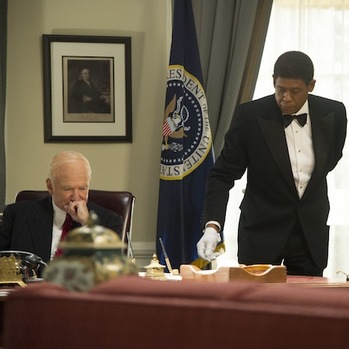Review:
"Lee Daniels' The Butler"

Release Date: Aug. 16, 2013
Rating: PG-13 Running Time: 132 minutes Inspired by a 2008 Washington Post article about retired White House domestic servant Eugene Allen, Lee Daniels’ The Butler recalls the civil rights struggle of the 1960s and 1970s through the eyes of an African-American man who witnessed history unfold from a unique vantage point. Forest Whitaker stars as Cecil Gaines, a White House butler who spends 34 years waiting on eight U.S. presidents, beginning with Dwight D. Eisenhower (Robin Williams) and ending with Ronald Reagan (Alan Rickman). No one is more surprised by Cecil’s ability to land such a prestigious job than Cecil. He was raised on the same cotton farm where he witnessed his father’s murder at the hands of the white man who also raped Cecil’s mother. Fearful that he might meet the same fate, Cecil leaves the cotton farm as a teenager and immediately uses the skills he’s learn to land a hotel job. He’s hired at the White House at a time when the civil rights movement is in its infancy. Director Lee Daniels and screenwriter Danny Strong, who previously wrote such politically charged HBO films asRecount and Game Change, juxtapose Cecil’s experiences in the White House against the fight that his son Louis (David Oyelowo) wages as a civil-rights activist. This really is a study in contrasts. Having seen racism at its most ugly, it’s understandable why Cecil would prefer to be seen and not heard rather than jeopardize a comfortable job that allows him to protect his family as best as he can. It’s Cecil’s quiet, compliance existence that inspires Louis to act on his anger and fight for racial equality. To be honest, the journey Louis undertakes is far more compelling than watching Cecil pour tea for the U.S. presidents he places his trust in to fight for his rights. The only problem is that Strong drops Louis in the middle of every pivotal moment in the civil rights struggles. This is a plot device that may have worked a fantastical 20th-century history lesson like Forrest Gump but it requires a willing suspension of disbelief for a serious-minded look at racial tension during the same period of time. You can see the rage boil inside Oyelowo as his Louis encounters racism in every aspect of his life. On the other hand, Whitaker internalizes the fear and fury that grips Cecil. It goes hand in hand with his belief that servants—especially African-American servants—must be invisible when performing their duties. Cecil often has to bite his tongue when he hears one president discuss clamping down on civil rights activities or pushing for equal rights for minorities. While the presidents use Cecil as a sounding board for their thoughts on civil rights, Cecil never interacts with them and he certainly doesn’t speaks the truth as he sees it. He barely does so with his wife (Oprah Winfrey). The scared, immobilized Cecil we first see in the cotton farm cradling his slain father is the same scared, immobilized Cecil who waits until the Reagan administration to finally make his voice heard. Is this nonviolent resistance on Cecil’s part? Or just a concerted effort by an African-American man to be what his white employees want him to be at a time when a white man who threaten, harm or kill an African American without fear of reprisal? Regardless, it’s hard to buy into The Butler’s assertion that Cecil affects change simply by being in the presence of the most powerful men in the world. He’s a bystander to history. He won't even help or support his son in his bid to make the United States a better place for African Americans. As for the men who play the presidents, James Marsden imbues John F. Kennedy with considerable compassion and Alan Rickman humanizes Ronald Reagan. On the other hand, Liev Schreiber’s Lyndon B. Johnson and John Cusack’s Richard Nixon appear to have walked straight out of a Saturday Night Live sketch. Ultimately, it doesn’t matter how the presidents are portrayed in The Butler. They exist solely to build up or tear down Cecil’s hopes for a United States that would one day treat African Americans as human beings. At its best, The Butler forcefully reminds us how much progress how been made and has not been regarding race relations over the past 50 years. Robert Sims Aired: Aug. 15, 2013 Web site: http://www.weinsteinco.com/sites/leedanielsthebutler/ |
|
